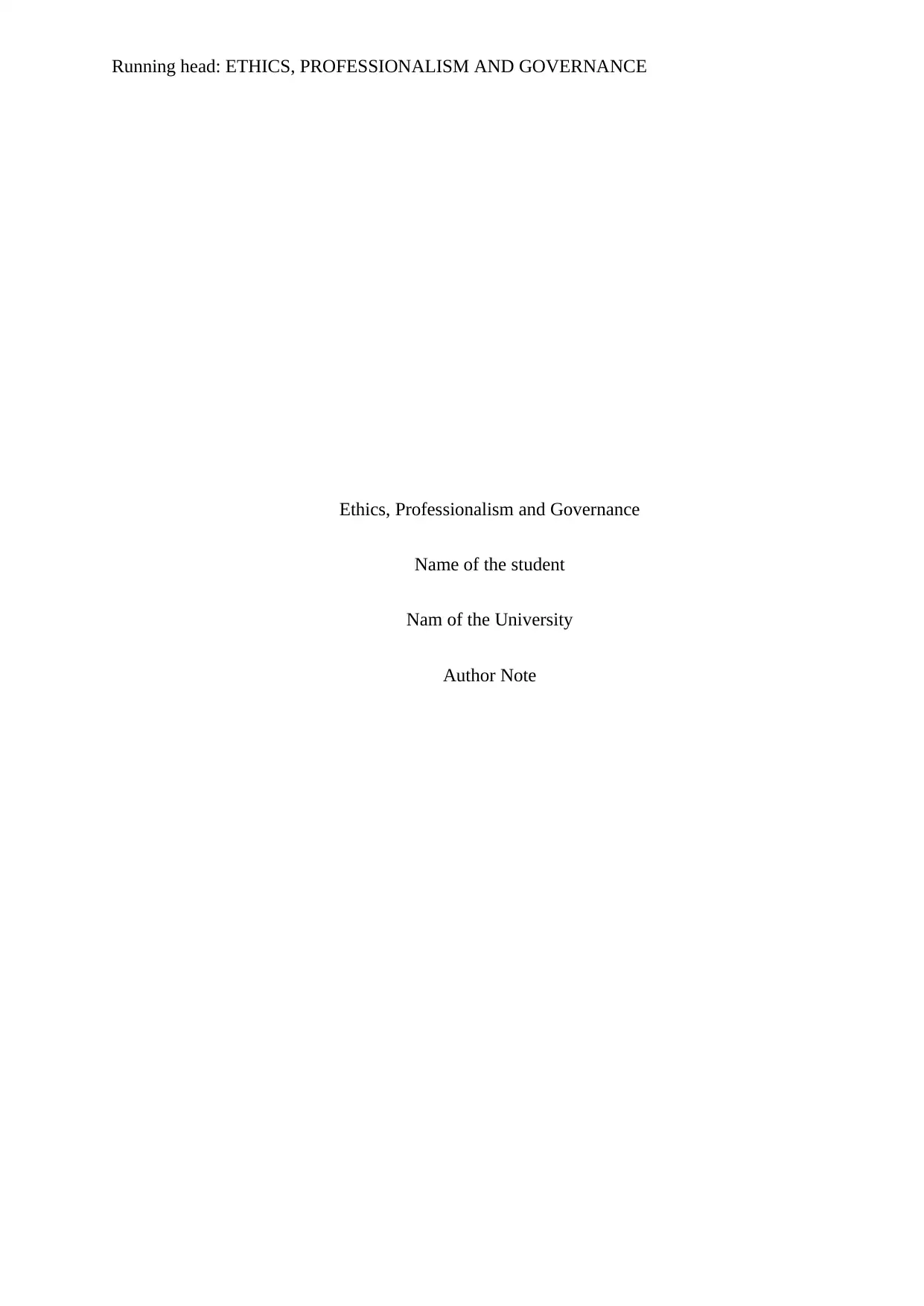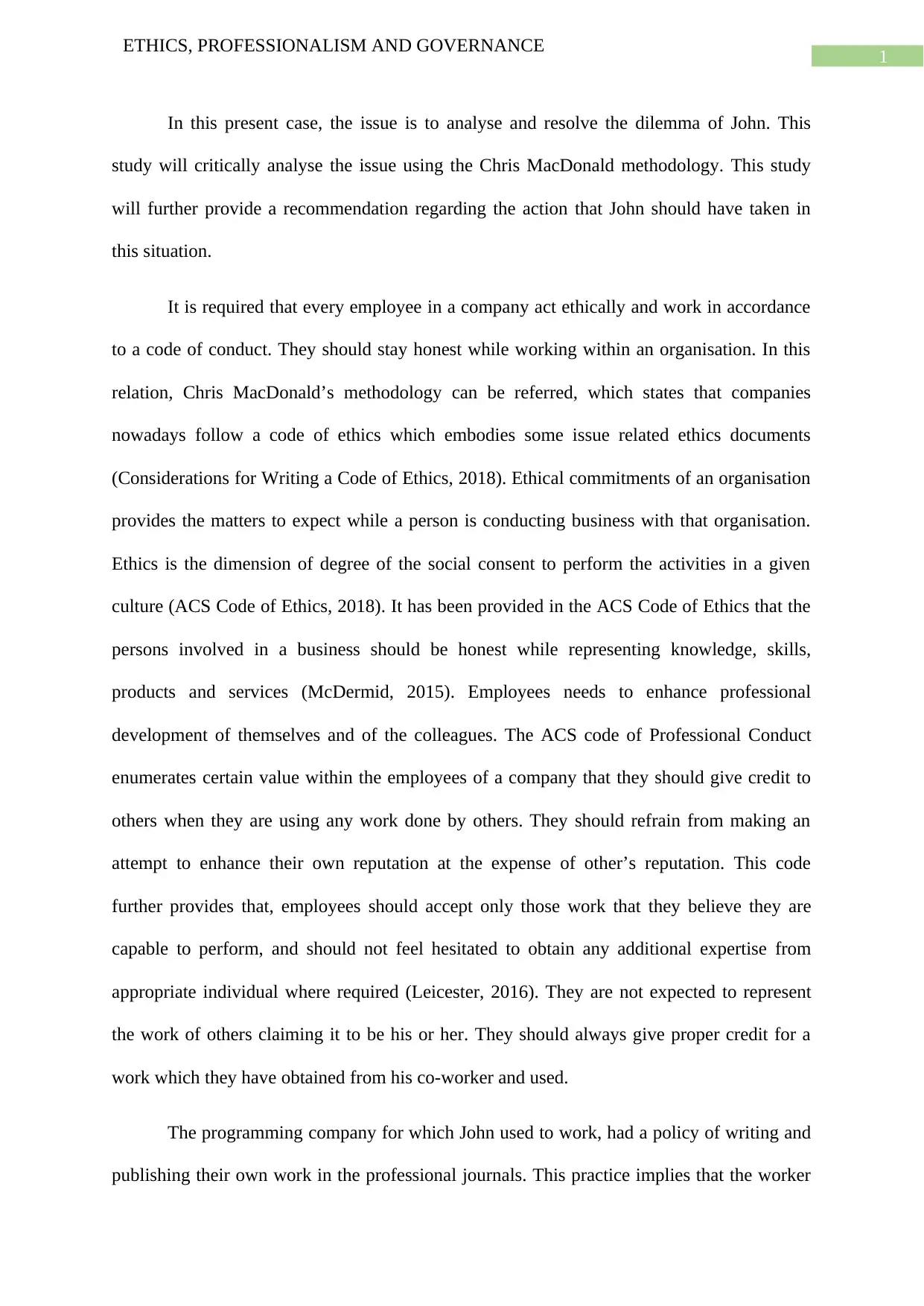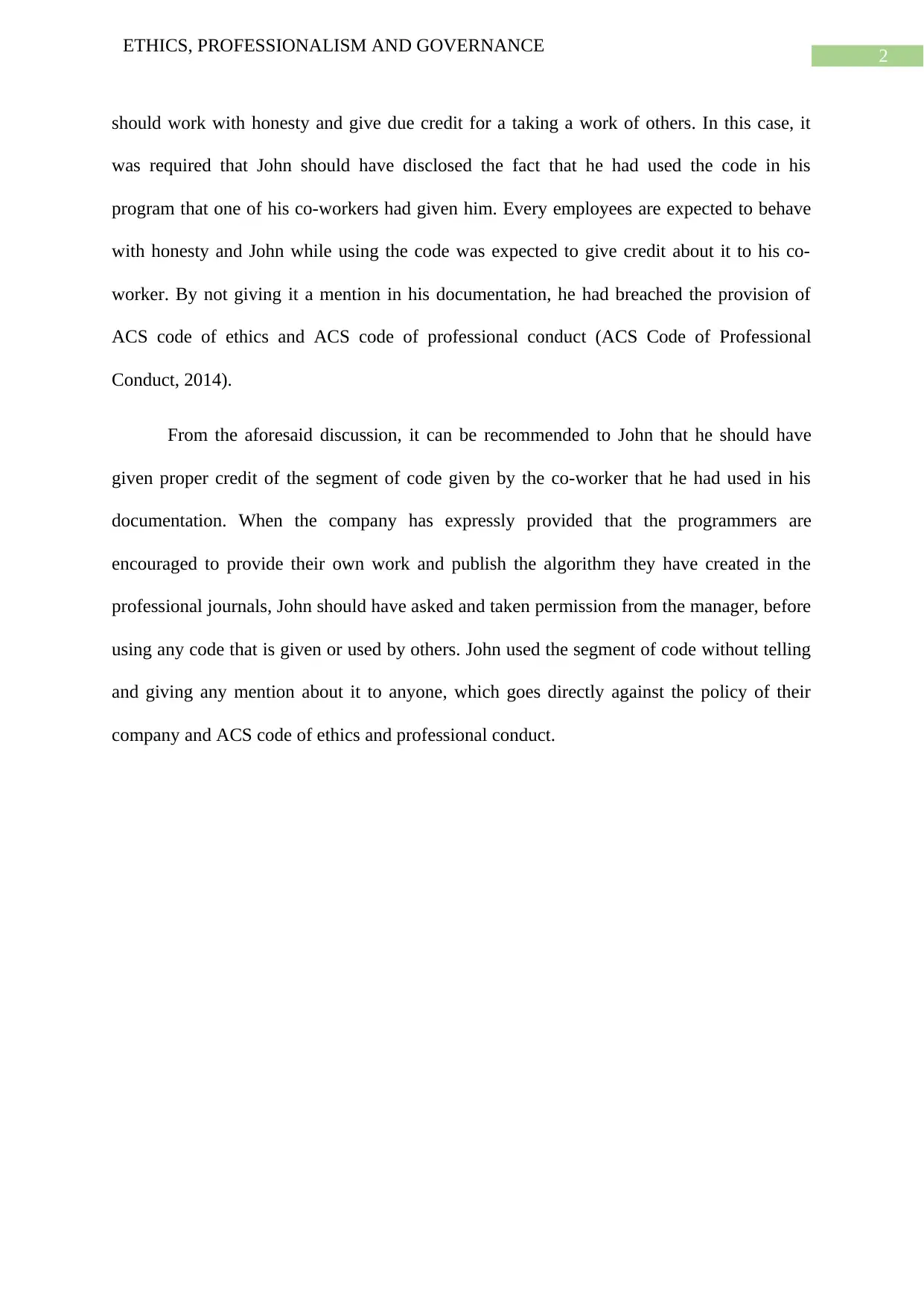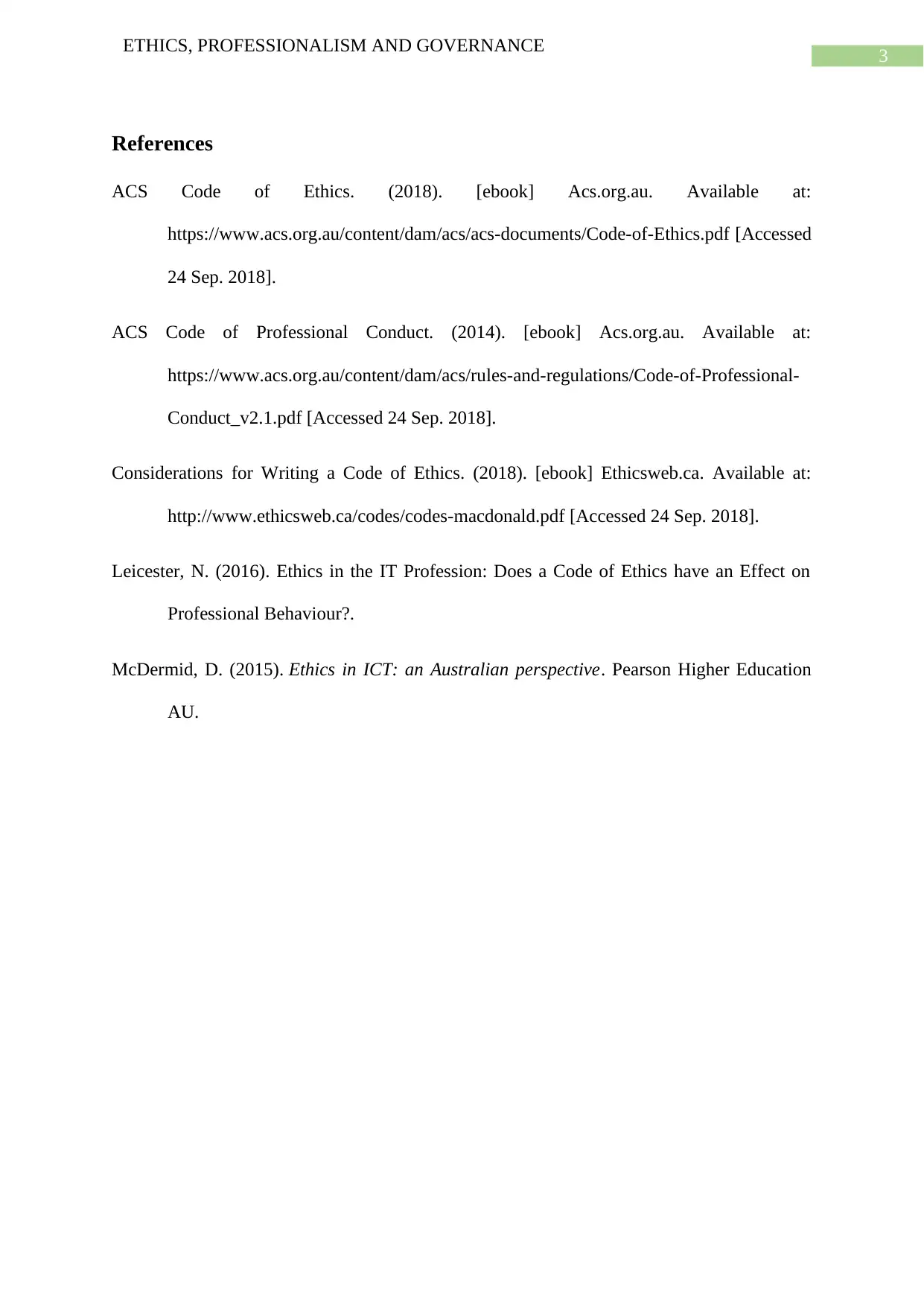Ethics, Professionalism, and Governance in Professional Environments
VerifiedAdded on 2023/06/04
|4
|783
|170
Case Study
AI Summary
This case study analyzes an ethical dilemma faced by John, a statistical database programmer, who used code from a coworker and a commercial software package without proper attribution. The analysis employs Chris MacDonald's methodology and the ACS Code of Ethics to evaluate John's actions. It highlights the importance of honesty, adherence to company policy, and giving credit to others' work. The study concludes that John breached ethical standards by not disclosing the use of external code and recommends that he should have sought permission and provided proper acknowledgment. The case underscores the necessity of ethical conduct and professionalism in programming and encourages programmers to contribute original work while respecting intellectual property rights.

Running head: ETHICS, PROFESSIONALISM AND GOVERNANCE
Ethics, Professionalism and Governance
Name of the student
Nam of the University
Author Note
Ethics, Professionalism and Governance
Name of the student
Nam of the University
Author Note
Paraphrase This Document
Need a fresh take? Get an instant paraphrase of this document with our AI Paraphraser

1
ETHICS, PROFESSIONALISM AND GOVERNANCE
In this present case, the issue is to analyse and resolve the dilemma of John. This
study will critically analyse the issue using the Chris MacDonald methodology. This study
will further provide a recommendation regarding the action that John should have taken in
this situation.
It is required that every employee in a company act ethically and work in accordance
to a code of conduct. They should stay honest while working within an organisation. In this
relation, Chris MacDonald’s methodology can be referred, which states that companies
nowadays follow a code of ethics which embodies some issue related ethics documents
(Considerations for Writing a Code of Ethics, 2018). Ethical commitments of an organisation
provides the matters to expect while a person is conducting business with that organisation.
Ethics is the dimension of degree of the social consent to perform the activities in a given
culture (ACS Code of Ethics, 2018). It has been provided in the ACS Code of Ethics that the
persons involved in a business should be honest while representing knowledge, skills,
products and services (McDermid, 2015). Employees needs to enhance professional
development of themselves and of the colleagues. The ACS code of Professional Conduct
enumerates certain value within the employees of a company that they should give credit to
others when they are using any work done by others. They should refrain from making an
attempt to enhance their own reputation at the expense of other’s reputation. This code
further provides that, employees should accept only those work that they believe they are
capable to perform, and should not feel hesitated to obtain any additional expertise from
appropriate individual where required (Leicester, 2016). They are not expected to represent
the work of others claiming it to be his or her. They should always give proper credit for a
work which they have obtained from his co-worker and used.
The programming company for which John used to work, had a policy of writing and
publishing their own work in the professional journals. This practice implies that the worker
ETHICS, PROFESSIONALISM AND GOVERNANCE
In this present case, the issue is to analyse and resolve the dilemma of John. This
study will critically analyse the issue using the Chris MacDonald methodology. This study
will further provide a recommendation regarding the action that John should have taken in
this situation.
It is required that every employee in a company act ethically and work in accordance
to a code of conduct. They should stay honest while working within an organisation. In this
relation, Chris MacDonald’s methodology can be referred, which states that companies
nowadays follow a code of ethics which embodies some issue related ethics documents
(Considerations for Writing a Code of Ethics, 2018). Ethical commitments of an organisation
provides the matters to expect while a person is conducting business with that organisation.
Ethics is the dimension of degree of the social consent to perform the activities in a given
culture (ACS Code of Ethics, 2018). It has been provided in the ACS Code of Ethics that the
persons involved in a business should be honest while representing knowledge, skills,
products and services (McDermid, 2015). Employees needs to enhance professional
development of themselves and of the colleagues. The ACS code of Professional Conduct
enumerates certain value within the employees of a company that they should give credit to
others when they are using any work done by others. They should refrain from making an
attempt to enhance their own reputation at the expense of other’s reputation. This code
further provides that, employees should accept only those work that they believe they are
capable to perform, and should not feel hesitated to obtain any additional expertise from
appropriate individual where required (Leicester, 2016). They are not expected to represent
the work of others claiming it to be his or her. They should always give proper credit for a
work which they have obtained from his co-worker and used.
The programming company for which John used to work, had a policy of writing and
publishing their own work in the professional journals. This practice implies that the worker

2
ETHICS, PROFESSIONALISM AND GOVERNANCE
should work with honesty and give due credit for a taking a work of others. In this case, it
was required that John should have disclosed the fact that he had used the code in his
program that one of his co-workers had given him. Every employees are expected to behave
with honesty and John while using the code was expected to give credit about it to his co-
worker. By not giving it a mention in his documentation, he had breached the provision of
ACS code of ethics and ACS code of professional conduct (ACS Code of Professional
Conduct, 2014).
From the aforesaid discussion, it can be recommended to John that he should have
given proper credit of the segment of code given by the co-worker that he had used in his
documentation. When the company has expressly provided that the programmers are
encouraged to provide their own work and publish the algorithm they have created in the
professional journals, John should have asked and taken permission from the manager, before
using any code that is given or used by others. John used the segment of code without telling
and giving any mention about it to anyone, which goes directly against the policy of their
company and ACS code of ethics and professional conduct.
ETHICS, PROFESSIONALISM AND GOVERNANCE
should work with honesty and give due credit for a taking a work of others. In this case, it
was required that John should have disclosed the fact that he had used the code in his
program that one of his co-workers had given him. Every employees are expected to behave
with honesty and John while using the code was expected to give credit about it to his co-
worker. By not giving it a mention in his documentation, he had breached the provision of
ACS code of ethics and ACS code of professional conduct (ACS Code of Professional
Conduct, 2014).
From the aforesaid discussion, it can be recommended to John that he should have
given proper credit of the segment of code given by the co-worker that he had used in his
documentation. When the company has expressly provided that the programmers are
encouraged to provide their own work and publish the algorithm they have created in the
professional journals, John should have asked and taken permission from the manager, before
using any code that is given or used by others. John used the segment of code without telling
and giving any mention about it to anyone, which goes directly against the policy of their
company and ACS code of ethics and professional conduct.
⊘ This is a preview!⊘
Do you want full access?
Subscribe today to unlock all pages.

Trusted by 1+ million students worldwide

3
ETHICS, PROFESSIONALISM AND GOVERNANCE
References
ACS Code of Ethics. (2018). [ebook] Acs.org.au. Available at:
https://www.acs.org.au/content/dam/acs/acs-documents/Code-of-Ethics.pdf [Accessed
24 Sep. 2018].
ACS Code of Professional Conduct. (2014). [ebook] Acs.org.au. Available at:
https://www.acs.org.au/content/dam/acs/rules-and-regulations/Code-of-Professional-
Conduct_v2.1.pdf [Accessed 24 Sep. 2018].
Considerations for Writing a Code of Ethics. (2018). [ebook] Ethicsweb.ca. Available at:
http://www.ethicsweb.ca/codes/codes-macdonald.pdf [Accessed 24 Sep. 2018].
Leicester, N. (2016). Ethics in the IT Profession: Does a Code of Ethics have an Effect on
Professional Behaviour?.
McDermid, D. (2015). Ethics in ICT: an Australian perspective. Pearson Higher Education
AU.
ETHICS, PROFESSIONALISM AND GOVERNANCE
References
ACS Code of Ethics. (2018). [ebook] Acs.org.au. Available at:
https://www.acs.org.au/content/dam/acs/acs-documents/Code-of-Ethics.pdf [Accessed
24 Sep. 2018].
ACS Code of Professional Conduct. (2014). [ebook] Acs.org.au. Available at:
https://www.acs.org.au/content/dam/acs/rules-and-regulations/Code-of-Professional-
Conduct_v2.1.pdf [Accessed 24 Sep. 2018].
Considerations for Writing a Code of Ethics. (2018). [ebook] Ethicsweb.ca. Available at:
http://www.ethicsweb.ca/codes/codes-macdonald.pdf [Accessed 24 Sep. 2018].
Leicester, N. (2016). Ethics in the IT Profession: Does a Code of Ethics have an Effect on
Professional Behaviour?.
McDermid, D. (2015). Ethics in ICT: an Australian perspective. Pearson Higher Education
AU.
1 out of 4
Related Documents
Your All-in-One AI-Powered Toolkit for Academic Success.
+13062052269
info@desklib.com
Available 24*7 on WhatsApp / Email
![[object Object]](/_next/static/media/star-bottom.7253800d.svg)
Unlock your academic potential
Copyright © 2020–2025 A2Z Services. All Rights Reserved. Developed and managed by ZUCOL.




